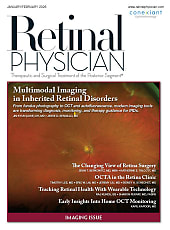The following transcript has been edited for clarity:
Good morning, I'm Jim Gallagher, editor of Retinal Physician, and I'm speaking this morning with Allen C. Ho, MD, FACS, the director of retina research at Wills Eye Hospital and Mid-Atlantic Retina. Dr. Ho, you presented long-term data at AAO on Nanoscope Therapeutic’s MCO-010 for retinitis pigmentosa. Can you speak a little bit about the data?
Allen C. Ho, MD, FACS: Thanks for having me, Jim. It's good to be here again. This was an AAO retina subspecialty day late-breaker on long-term results of an optogenetic strategy, MCO-010, [in a] randomized, controlled, multicenter clinical trial for patients with severe vision loss due to retinitis pigmentosa from a variety of retinal mutations. This is a mutation-agnostic approach to retinal degenerations. What we presented on were the fact that the visual acuity gains in year 1 and year 2 were extended to year 3 in the long-term follow up. Specifically, at year 1, the primary endpoint, there were 40% of patients with severe vision loss. This trial enrolled patients with very advanced vision loss—hand motions, bare light perception, light perception were the best visual acuity criteria for entry—and taking some of these patients from that kind of vision to on-chart vision—like 20/400, 20/800—in 40% of patients at the primary endpoint, at 1 year. [This was] statistically significant improvement compared to sham. Fifty-five percent at the key secondary endpoint of 76 weeks. Now, at 3 years, durable clinically meaningful vision gains for these patients, on the order of 0.3 logMAR, which is the equivalent of 3 lines gained.
Excellent safety—some inflammation that's controlled with topical drops. We’ve seen this in other gene therapy programs. No serious ocular adverse events of special interest. No retinitis, vasculitis, choroiditis, optic neuropathy, or hypotony. This is really important when you consider intravitreal gene therapy.
So the take-home is that this mutation-agnostic, in-office single-injection optogenetic strategy is showing durable, meaningful improvement in vision in this study, which enrolled 27 subjects: 18 subjects to active treatment and 9 subjects to an active sham control.
Retinal Physician: That is really encouraging data, Dr. Ho. Can you talk a little bit about how optogenetics works? This is a gene-agnostic approach, so can you explain that a little bit and how that offers promise not just for retinitis pigmentosa but for other retinal disease as well?
Dr. Ho: Absolutely. So optogenetics is using gene therapy techniques—in this case, encoding for a light-sensitive transmembrane protein or an opsin. MCO-010 is a bioengineered, synthetic, next-generation opsin with very favorable features of visible light sensitivity. Fast on and off activation/deactivation—no need for special amplification of a light signal, like special goggles. This gene is encoded in and placed in an AAV2 vector and then is injected.
Where you lose photoreceptors, like rods and cones, this targets the bipolar cells and activates and creates a de facto photoreceptor out of residual remaining cells. That's really important in this very heterogeneous group of patients with retinal degenerations because it is, as you mentioned, mutation- or gene-agnostic. That transmembrane protein then gets activated by light. These opsins, or this synthetic opsin, is showing improvement in visual function and clinically meaningful changes for patients. For example, the ability to see shapes better, the ability to navigate better, the ability to see color in some of the patients. It didn’t work in all of the patients, but there were statistically meaningful improvements.
I think it's important to know that optogenetics has been tried before and hasn’t worked. But this is next generation. If you pull back into gene therapy and all of medicine, starting first in the subretinal space with Luxterna (Spark Therapeutics) for a very specific retinal degeneration, Leber congenital amaurosis (LCA). I think since that [approval] in 2017, we’ve had about 30 gene therapies approved across all of medicine. Now we're bringing it back to the retina for these most needy patients with severe retinal degeneration. For 30 years I've been trying not to create false hope, but now I think there's meaningful hope for these patients.
This is being submitted for retinitis pigmentosa by [Nanoscope Therapeutics] to the FDA in a rolling, fast-track, orphan designation. “Rolling admission biologics application” means the pieces are being submitted; it’s already started, and the package will be submitted in its entirety in the first half of 2026. We're also looking at this strategy to activate remaining retinal cells in other types of retinal diseases where there's loss of photoreceptors, like Stargardt macular dystrophy, age-related macular degeneration (AMD), and geographic atrophy. The Stargardt program is already in the clinic with a completed phase 2 trial, and will be progressing to phase 3 next year, and AMD/geographic atrophy is also in the works.
RP: Amazing, that is great news for people with inherited retinal diseases and with other retinal diseases. Thank you very much for speaking with Retinal Physician today.
Dr. Ho: My pleasure to be here. RP








